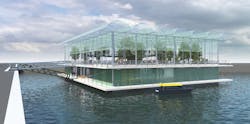When pigs fly? How about when cows float?
By David Malone, Associate Editor
Farm-to-table dining has officially made the transition from the “I did it before it was cool” hipster movement into the mainstream. The problem is, space limitations in cities around the world mean the farm can only be so close to the table. But Beladon, a Dutch property development firm, has plans to bring farms from the country to the big city.
Most large cities around the world are situated near bodies of water that provide open spaces in land-strapped areas. Floating Farm is Beladon’s plan for taking advantage of these spaces. A pilot project is currently being constructed in Rotterdam’s Merwehaven Harbor on a floating concrete platform that, when completed, will hold 40 cows whose milk will be used to make yogurt, cream, and cheese.
The multistory floating structure will house the cows on the second story. This area will be a garden-like environment that provides high animal welfare standards. The roof will have a rainwater collection system and PV panels. On the story below the cows will be collection bins for manure and urine, which robots will collect throughout the day (robots will also milk and feed the cows). The manure will be used as fertilizer to help grow new fodder for the cows.
See Also: Curtain walls go circadian
The entire process will create a self-sustaining closed circle. Think of it as a less majestic version of the circle of life.
The main-level factory floor will have spaces for LED grass production, dairy production, water purification, and manure and urine processing.
A spiral staircase will connect to the cow habitat above and act as a visitor lookout. A gangway will connect to a cow pasture back on land.
The pilot project is designed for cows, but the plans theoretically could be adapted to allow for producing poultry, fruits, and vegetables.
Beladon estimates the farm will produce more than 200 gallons of milk and yogurt a day when fully functional.
